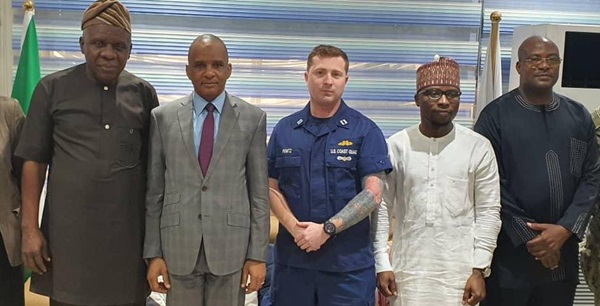
In a significant development for maritime security, the United States Coast Guard (USCG) has proposed a three-year plan to collaborate with the Nigerian Maritime Administration and Safety Agency (NIMASA) for the removal of the Condition of Entry (CoE) imposed on American-bound vessels departing from Nigeria.
This strategic initiative was unveiled by Cdr. Juliet Hudson during a peer review visit by a delegation from NIMASA to the USCG headquarters in Washington DC.
Hudson announced a bi-annual assessment plan to evaluate the compliance level with the International Ship and Port Facility Security (ISPS) Code at Nigerian ports, working in close partnership with NIMASA. The purpose of these assessments is to update the Port Advisory Security Portal in the White House, with the ultimate goal of completely lifting the Condition of Entry. Hudson commended NIMASA for its commitment to ISPS implementation, acknowledging the agency’s efforts in enhancing maritime security.
The director-general of NIMASA, Dr. Bashir Jamoh received the USCG advisor, Lt. Benjamin Montz and the accompanying delegation. Jamoh expressed NIMASA’s dedication to prioritising safety and security in Nigeria’s waterways, aligning with the objectives of the ‘Blue Economy’. Recognising the pivotal role Nigeria plays in the Gulf of Guinea (GoG), Jamoh urged the USCG to extend its support to other countries in the region. He emphasised that collaboration and support should be region-wide to strengthen the maritime security architecture in the Gulf of Guinea.
Highlighting Nigeria’s role as a major stakeholder in the Gulf of Guinea, Jamoh noted that activities in the region largely revolve around Nigeria. He appreciated the support from the USCG and called for an extension of this support to other GoG countries, emphasising that the strength of the region’s security chain is dependent on the collective efforts of all stakeholders. Jamoh emphasised the need for comprehensive support to consolidate the gains of the ‘Deep Blue Project’ in the region.
Moreover, Jamoh solicited assistance from the USCG in training NIMASA personnel, recognising the importance of capacity building in enhancing maritime security. He proposed conducting a gap analysis to identify training needs, with subsequent synchronisation with the USCG to ensure that the right personnel receive the appropriate training. This collaborative training initiative aims to further align NIMASA’s capabilities with international best practices in maritime security.
Leading the USCG delegation, Montz outlined their plans to support NIMASA in training initiatives and collaborate on improving safety and security in Nigeria’s maritime sector, specifically focusing on port operations. The collaboration between NIMASA and the USCG is integral to the implementation of the International Ships and Ports Security (ISPS) facility code in Nigeria. Over the years, NIMASA has consistently worked with relevant stakeholders, with the USCG providing crucial support to enhance the safety and security of Nigeria’s waterways and the broader Gulf of Guinea.
This collaborative effort signifies a proactive approach to maritime security, emphasising the importance of international partnerships in addressing shared challenges.
The proposed three-year plan and ongoing collaboration between NIMASA and the USCG underscore a commitment to creating a safer and more secure maritime environment in Nigeria and the Gulf of Guinea. As both entities work together, the potential for improved compliance with international maritime security standards and the removal of restrictive conditions on vessels departing from Nigeria becomes a tangible and positive outcome of this collaborative endeavour.

